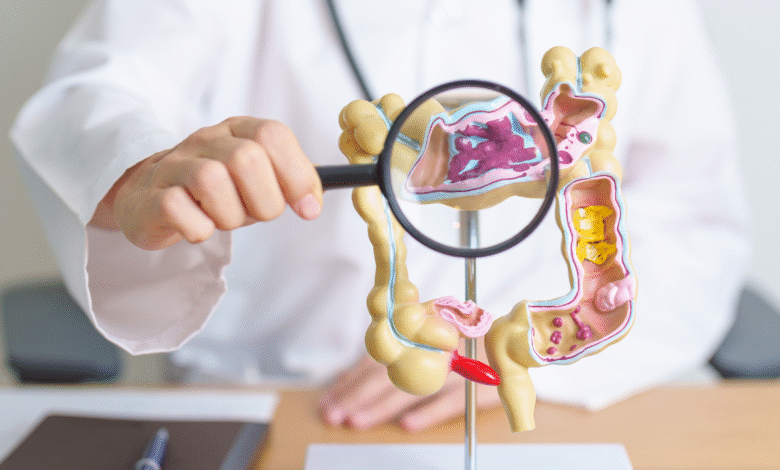Blog
कोलोनोस्कोपी स्क्रीनिंग: अपनी बड़ी आंत की जाँच क्यों है ज़रूरी?
बड़ी आंत की जांच क्यों जरूरी है? Colonoscopy Screening समझें

कोलोनोस्कोपी स्क्रीनिंग क्या है?
- कोलोनोस्कोपी स्क्रीनिंग एक चिकित्सा प्रक्रिया है जिसका उपयोग बड़ी आंत (कोलन और मलाशय) के अंदरूनी हिस्से की जांच करने के लिए किया जाता है।
- यह मुख्य रूप से कोलोरेक्टल कैंसर (पेट का कैंसर) और अन्य आंतों की समस्याओं जैसे पॉलीप्स (छोटी वृद्धि), सूजन, रक्तस्राव और अल्सर का पता लगाने और रोकने के लिए की जाती है।
यह कैसे काम करती है?
- इस प्रक्रिया में, एक एंडोस्कोप (एक लंबी, पतली और लचीली ट्यूब जिसके सिरे पर एक छोटा कैमरा और प्रकाश होता है) को गुदा के माध्यम से धीरे-धीरे बड़ी आंत में डाला जाता है।
- कैमरा डॉक्टर को कंप्यूटर स्क्रीन पर आंत की अंदरूनी दीवार की विस्तृत तस्वीरें देखने की अनुमति देता है।
- यदि कोई असामान्य वृद्धि, जैसे पॉलीप्स, दिखाई देती है, तो डॉक्टर उन्हें हटा सकते हैं या बायोप्सी (जांच के लिए ऊतक का एक छोटा नमूना लेना) ले सकते हैं।
कोलोनोस्कोपी स्क्रीनिंग क्यों महत्वपूर्ण है?
- कैंसर की रोकथाम: कोलोनोस्कोपी का सबसे महत्वपूर्ण लाभ यह है कि यह कोलोरेक्टल कैंसर को शुरुआती चरण में ही पकड़ सकता है, जब इसका इलाज सबसे प्रभावी होता है। अधिकांश कोलोरेक्टल कैंसर पॉलीप्स से शुरू होते हैं, और कोलोनोस्कोपी के दौरान इन पॉलीप्स को कैंसर बनने से पहले ही हटाया जा सकता है।
- अन्य समस्याओं का पता लगाना: यह आंतों की अन्य समस्याओं जैसे डायवर्टीकुलोसिस (आंत की दीवारों में छोटे पाउच), कोलाइटिस (आंतों की सूजन) और क्रोहन रोग (पाचन तंत्र की एक पुरानी सूजन संबंधी बीमारी) का भी पता लगा सकता है।
- लक्षणों की जांच: यदि आपको पेट दर्द, शौच की आदतों में बदलाव, मलाशय से रक्तस्राव या अस्पष्टीकृत वजन घटाने जैसे लक्षण हैं, तो डॉक्टर इन लक्षणों के कारण का पता लगाने के लिए कोलोनोस्कोपी की सिफारिश कर सकते हैं।
किसे कोलोनोस्कोपी स्क्रीनिंग करवानी चाहिए?
- सामान्य जोखिम वाले व्यक्ति: आमतौर पर, 45 वर्ष और उससे अधिक आयु के व्यक्तियों को नियमित कोलोनोस्कोपी स्क्रीनिंग की सलाह दी जाती है, भले ही उनमें कोई लक्षण न हों।
- उच्च जोखिम वाले व्यक्ति: यदि आपके परिवार में कोलोरेक्टल कैंसर का इतिहास है, आपको आंतों की सूजन संबंधी बीमारी है, या आपको कुछ आनुवंशिक सिंड्रोम हैं, तो आपको कम उम्र में या अधिक बार स्क्रीनिंग की आवश्यकता हो सकती है। आपके डॉक्टर आपकी व्यक्तिगत जोखिम कारकों के आधार पर सलाह देंगे।
प्रक्रिया से पहले की तैयारी क्या है?
कोलोनोस्कोपी की सफलता के लिए आंतों का पूरी तरह से साफ होना बहुत महत्वपूर्ण है। तैयारी में आमतौर पर शामिल हैं:
- विशेष आहार: प्रक्रिया से कुछ दिन पहले ठोस भोजन से बचना और केवल स्पष्ट तरल पदार्थ (जैसे पानी, स्पष्ट शोरबा, सेब का रस, चाय) पीना।
- आंत्र तैयारी समाधान: आंतों को साफ करने के लिए एक विशेष रेचक समाधान पीना। यह मल को बाहर निकालने में मदद करता है।
- दवाओं के बारे में जानकारी: डॉक्टर को अपनी सभी मौजूदा दवाओं, विशेषकर रक्त-पतला करने वाली दवाओं के बारे में बताना।
प्रक्रिया के दौरान क्या है?
- प्रक्रिया के दौरान आपको आमतौर पर हल्की बेहोशी की दवा (सेडेशन) दी जाएगी ताकि आप आरामदायक महसूस करें और दर्द महसूस न करें।
- प्रक्रिया में आमतौर पर 30 से 60 मिनट लगते हैं।
प्रक्रिया के बाद क्या है?
- आपको कुछ घंटों के लिए रिकवरी रूम में रखा जाएगा जब तक कि बेहोशी का असर खत्म न हो जाए।
- आपको कुछ दिनों के लिए पेट में हल्का दर्द या गैस महसूस हो सकती है।
- परिणामों पर चर्चा करने और आगे के कदमों की योजना बनाने के लिए डॉक्टर आपको फॉलो-अप अपॉइंटमेंट देंगे।
जोखिम और जटिलताएँ क्या है?
कोलोनोस्कोपी एक सुरक्षित प्रक्रिया है, लेकिन कुछ दुर्लभ जोखिम और जटिलताएँ हो सकती हैं, जैसे:
- रक्तस्राव (खासकर पॉलीप हटाने के बाद)
- आंत की दीवार में छेद (छिद्रण)
- संक्रमण
- बेहोशी से संबंधित प्रतिक्रियाएँ
इन जटिलताओं का जोखिम बहुत कम होता है। आपके डॉक्टर आपको प्रक्रिया से पहले सभी संभावित जोखिमों और लाभों के बारे में विस्तार से बताएंगे।





